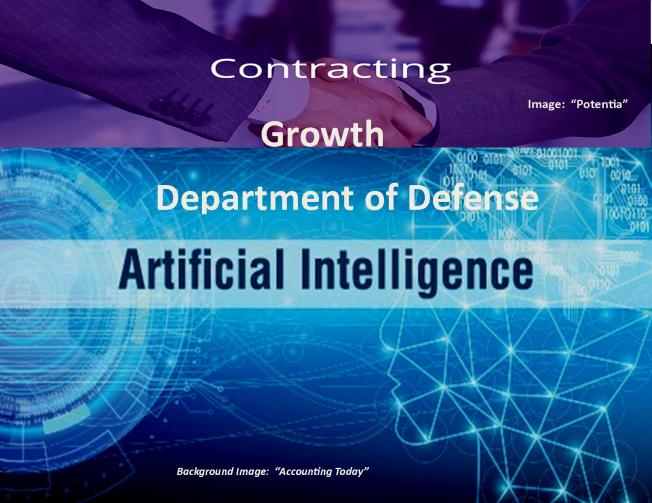
“WASHINGTON TECHNOLOGY” By Stephanie Meloni
“As the Department of Defense starts looking at ways that artificial intelligence can modernize operations and move to a more proactive defense posture, technology vendors will play a key role in its success.
That means all contractors will need to track how DOD’s strategy develops in the next few years, as resources shift from prototyping to production.”
________________________________________________________________________________________
“With the technology’s inclusion in the 2018 National Defense Strategy, the DOD has made it clear that they need to emphasize AI capabilities. Senior leadership seems concerned that without an AI strategy the US will fall behind its adversaries in warfighting technology. To that end, the DOD is planning to stand up a center to deliver AI solutions across the department, and has proposed an AI and machine learning council as part of the fiscal 2019 National Defense Authorization Act.
AI and machine learning spending in the DOD is expected to increase modestly over the next two years, mainly as part of the research and development budget. More increases are expected in out-year budgets as the AI roadmap matures. DOD customers will be looking to AI technology for many of the same use cases for big data and analytics—everything from tactical, warfighting decision-making down to business and operations and backend office functions.
WHERE TO START
Technology companies interested in AI and machine learning opportunities will want to become involved with DOD innovation hubs—places like DIUX (Defense Innovation Unit Experimental) or other OTA (Other Transactional Authority) consortiums, which is where much of the prototyping and contracting activity for more cutting-edge technologies will take place. DOD leaders are keenly aware that adversaries do not face the same acquisition holdups, and want to ensure rapid technology adoption to keep pace.
Vendors will also want to be aware of the challenges that DOD customers face as they begin to implement AI and machine learning into their day-to-day operations. Customers with business, enterprise or cyber requirements may be easier ways to get a foot in the door, since they overlap with existing commercial solutions. DOD wants to use both commercial and off-the-shelf capabilities wherever possible, such as the Defense Information Systems Agency Acropolis and Big Data Platform, where they’re already using machine learning to combat cyber threats and attacks.
Other organizations in the DOD that are working warfighting problems may require more customization. Defense Advanced Research Projects Agency, for example, solves tactical problems that would not be found in the private sector. One of their current AI projects, Urban Reconnaissance through Supervised Autonomy (URSA), looks at how to automate the process of identifying friend or foe in an urban, tactical environment. Most of URSA’s capabilities will need to come internally from the DOD or be custom developed by the defense industry.
Beyond understanding how a customer will incorporate machine learning into its portfolio, there are concerns over giving a machine too much power in the decision-making loop. For that reason, many leaders will refer to AI for now as “human and machine teaming.” In these early stages of implementation, AI use cases for the DOD will not extend to lethality; rather, the focus is to save money, manpower and level of effort.
WHERE THE OPPORTUNITIES ARE NOW
As the demand for AI capability grows (and given the limited capabilities within the DOD), there will be new opportunities for contractor and outside data science services and product support. What’s more, there will be a growing need to implement cloud, infrastructure, cybersecurity and Internet of Things (IoT) technologies.
AI also puts a tremendous amount of pressure on a customer’s data. Clean, authoritative and trustworthy data is the foundation of all analytics, and AI is no exception. This means increased demand not only for data integration tools but also data quality and preparation tools. The emphasis on data itself will also extend to cybersecurity—if data is vulnerable to a cyber attack, the AI mission is at risk as well.
AI and machine learning is a topic that touches all technology categories. To move forward with AI solutions, vendors will need to team up to better understand how to configure their architecture, data collection and analysis and security. There will be no shortage of potential use cases within the DOD—customers will look at everything from IT and cyber operations and network defense, to intelligence and surveillance support, to logistics and maintenance.
Bottom line, AI can help the DOD modernize its tactical and enterprise operations and move from reactive to proactive defense posture. Technology vendors will be a key component to successful AI implementation – as long as they start working now to get a handle on how to map their companies’ capabilities to the DOD’s evolving needs.”
https://washingtontechnology.com/articles/2018/06/29/insights-meloni-ai-opportunities-trends.aspx
About the Author

Stephanie Meloni is a manager in the Market Intelligence Team of immixGroup, an Arrow company, which helps technology companies do business with the government. She can be reached at Stephanie_Meloni@immixgroup.com or connect with her on LinkedIn at http://www.linkedin.com/in/stephaniemeloni.